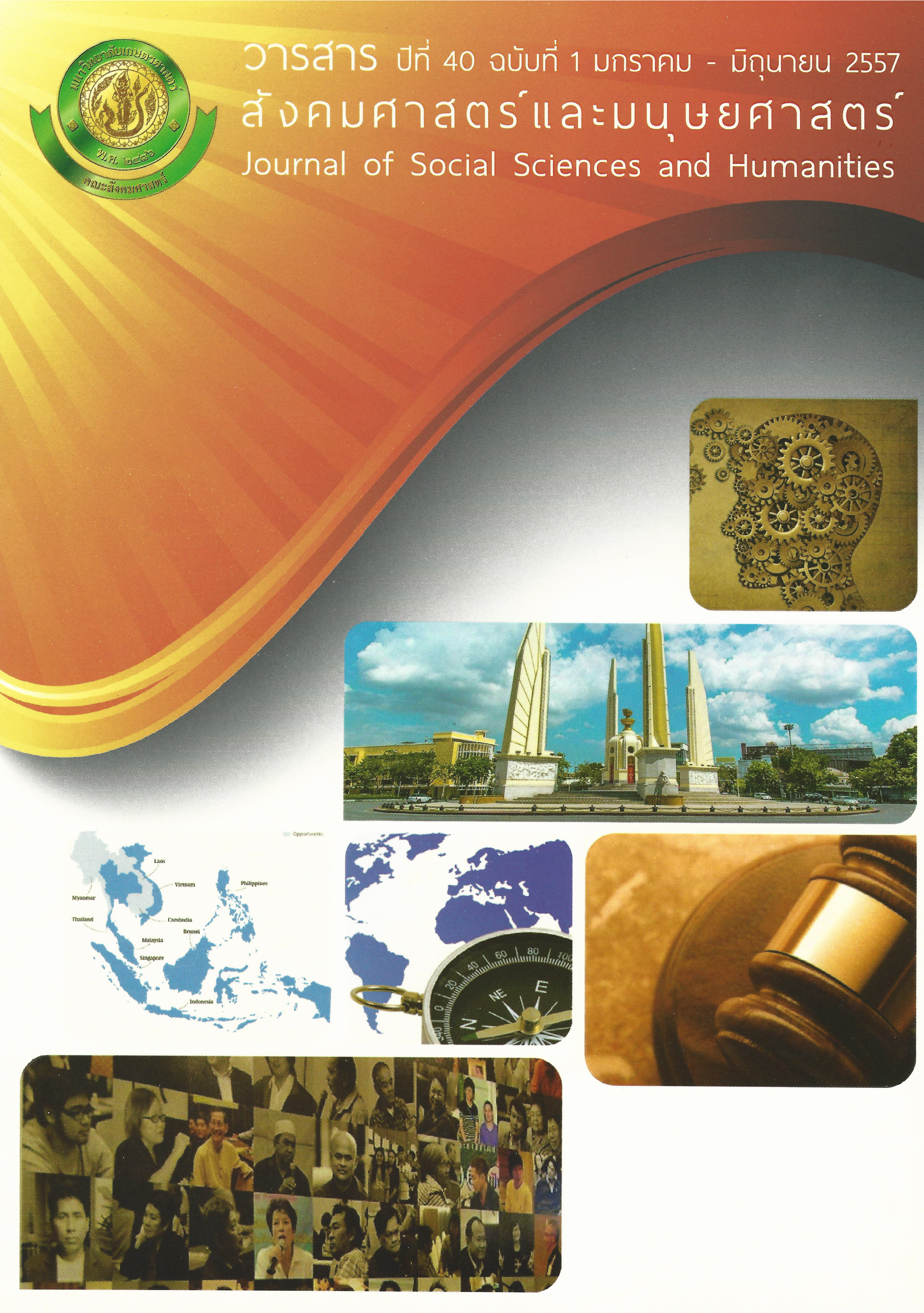ลักษณะและรูปแบบการดำเนินชีวิตของมารดาในครอบครัวแม่เลี้ยงเดี่ยว
Main Article Content
บทคัดย่อ
การวิจัยเชิงคุณภาพครั้งนี้ มีวัตถุประสงค์เพื่อศึกษารูปแบบการดำเนินชีวิตของแม่เลี้ยงเดี่ยวที่เป็นสมาชิกมูลนิธิเครือข่ายครอบครัวในเขตกรุงเทพมหานคร และเพื่อศึกษาวิธีการดำเนินชีวิตและการปรับตัวของครอบครัวแม่เลี้ยงเดี่ยวในสังคมเมืองของกรุงเทพมหานคร กลุ่มตัวอย่าง คือ แม่ที่เลี้ยงดูบุตรเพียงลำพังที่เป็นสมาชิกของมูลนิธิเครือข่ายครอบครัวเลี้ยงเดี่ยว จำนวน 15 คน ในเขตกรุงเทพมหานคร โดยการศึกษาเฉพาะกรณี และใช้การสัมภาษณ์เชิงลึก ผลจากการสัมภาษณ์กลุ่ม ตัวอย่าง พบว่า ด้านภูมิหลังทางครอบครัว กลุ่มตัวอย่างมีอายุน้อยที่สุด 38 ปี และอายุมากที่สุด 53 ปี สำเร็จการศึกษาสูงสุดในระดับปริญญาโท อยู่ในสถานภาพโสดและหย่าแล้ว ประกอบอาชีพพนักงานบริษัท มีรายได้เฉลี่ยต่อเดือน 30,000 บาท จำนวนบุตรเฉลี่ยหลังจากสิ้นสุดสถานภาพสมรส 1 คน ส่วนใหญ่เป็นเพศชาย สาเหตุของการเป็นแม่เลี้ยงเดี่ยว คือ สามีเสียชีวิตและการหย่าร้าง ระยะการมีสถานภาพเป็นแม่เลี้ยงเดี่ยวสูงสุดคือ 18 ปี และน้อยที่สุดคือ 1 ปี ด้านความเป็นอยู่ทั่วไปส่วนใหญ่มี
ความแตกต่างจากเดิมอย่างชัดเจน ตั้งแต่ในเรื่องรายรับที่น้อยลงส่งผลให้ความสามารถในการใช้จ่ายลดลง ด้านสุขภาพจิตมีความเครียดสะสม แต่ก็ยอมรับความจริงที่เกิดขึ้นและปรับตัวได้หลังจากเวลาผ่านไป ด้านรูปแบบการดำเนินชีวิตและการปรับตัวของมารดาในครอบครัวแม่เลี้ยงเดี่ยว การเตรียมตัวในเรื่องเลี้ยงบุตร บทบาทภาระหน้าที่ทั้งหมด แม่เลี้ยงเดี่ยวต้องเป็นผู้รับผิดชอบ ความรับผิดชอบด้านการเงิน มีการจัดเตรียมค่าใช้จ่ายในส่วนของบุตร ด้านอนาคตของบุตร ส่วนใหญ่มีการวางแผนอนาคตลูกไว้อย่างเป็นขั้นตอนทั้งเรื่องการเรียนและการนันทนาการกับบุตร ส่วนใหญ่ต้องการเพิ่มเวลาให้กับบุตรเพื่อทำกิจกรรมร่วมกัน
ข้อเสนอแนะจากผลการศึกษา ในเชิงปฏิบัติการ แม่จะต้องมีสติในการแก้ไขปัญหา คำนึงถึงจิตใจของบุตรเป็นที่สุด ให้กำลังใจตัวเอง ศึกษาเรียนรู้การอยู่ร่วมกับบุตร ข้อเสนอแนะต่อผู้ที่กำลังตัดสินใจเป็นแม่เลี้ยงเดี่ยวคือ ในกรณีหย่าร้าง ให้คิดไตร่ตรองก่อนว่าตัวแม่เลี้ยงเดี่ยวเองมีความพร้อมในด้านการดูแลบุตรได้คนเดียวหรือไม่ ในเชิงนโยบาย แม่เลี้ยงเดี่ยวที่กำลังอยู่ในภาวะวิกฤตควรได้รับความช่วยเหลือจากแม่เลี้ยงเดี่ยวผู้ที่มีประสบการณ์ เช่น การแนะนำทางด้านจิตใจ ทั้งนี้ ควรได้รับสวัสดิการจากภาครัฐและจากมูลนิธิเครือข่ายครอบครัวในด้านต่างๆ เช่น การให้คำปรึกษา
Life Aspects of Single Mothers
This qualitative research aimed to study the life aspects of single mothers in the Family Network Foundation in Bangkok as well as the single mothers’ way of life and how they adjusted themselves in the urban setting of Bangkok. The sample groups were 15 single mothers who are members of Family Network Foundation in Bangkok. Case studies were carried out along with the in-depth interviews.
The results of the study showed that the age of the sample group ranged from 38 to 53 years old. They were divorced and mostly attained postgraduate education. They worked as office employees and earned around 30,000 baht monthly. They had one child on average after the divorce. The majority of the children were male. The main cause for being single was having a deceased partner. The longest period of being single was 18 years and the shortest was 1 year. About the general wellbeing, there were drastic changes in many ways. Financially, they had less income and less purchasing power. Psychologically, they had mental stress due to the divorce which they had learned to cope and faced the situation as time progressed. Regarding the way of life, the adjustment and the preparation for child rearing, it was found that single mothers had to take all the responsibilities and establish a financial plan for her child’s future. Most of them had stepping plans in both education and social activities. They also wanted to spend more time with the child doing activities together as well.
Suggestions of the study were as follows. In practice, single mothers should be conscientious in order to solve problems, realizing that the child was her first priority, encourage themselves, and seek the way to live happily with her child. The advice for those considering becoming single mothers was that if a divorce was unavoidable, they should contemplate if they were able to raise the child on their own. In terms of policy, experienced single mothers should provide mental guidance for those who were facing the crisis. Government welfare and support from family organizations such as counseling and for the child’s activities should also be provided.


